.jpg)
April 2020
AAVMC and the COVID-19 Pandemic: Business Continues in a Radically Changed World

The COVID-19 pandemic has fundamentally changed the world in a matter of weeks. Morbidity and mortality figures are staggering; the economic impact is nearly unfathomable. Social distancing measures have profoundly altered the way people live their lives. But business operations continue, and for most – including the AAVMC– that means working from home.
“Our transition to teleworking has been seamless,” said AAVMC CEO Dr. Andrew T. Maccabe. “With the exception of business travel and some meetings like the Veterinary Educator Collaborative conference, our programs and services are operating as usual.”
Maccabe attributes that efficiency to some key investments in technology and a telework policy that has been in place for many years. Daily staff meetings are held via video teleconference to keep everything on track.
In addition, the timely introduction of a new enterprise-wide digital networking system called “AAVMC Connect” has been invaluable. A password-protected community of interest on Connect is enabling deans to work closely together as they develop institutional strategies for adapting to the pandemic. Other communities are up and running for other groups like the Academic Affairs and Research Committees.
“We see our role during this crisis as facilitating and supporting,” said Maccabe. “We are providing our members with the information they need to make the best decisions for their colleges and schools. We are also providing leadership for academic veterinary medicine as it collaborates with other areas of the profession and government.”
The Impact of the CARES Act on Academic Veterinary Medicine
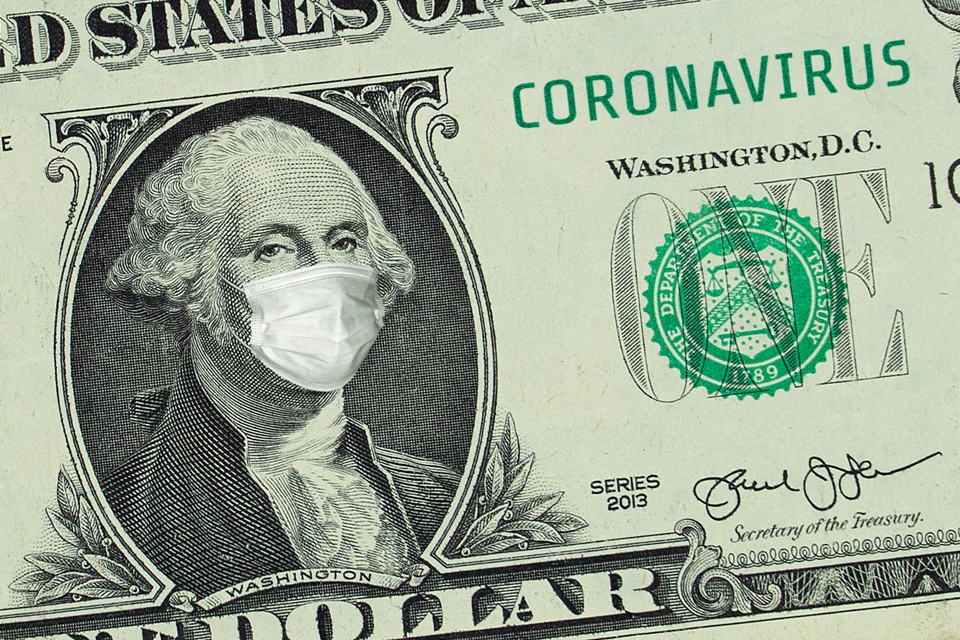
On March 27, the President signed into law H.R. 748, the Coronavirus
Aid, Relief and Economic Security (CARES) Act. The bill provides more
than $2.2 trillion in federal assistance to individuals, businesses, and
states, among others. There are several sections of interest to AAVMC
members, including:
1. Loans to small businesses. The bill creates the Paycheck Protection Program to let small businesses, nonprofits and individuals seek loans through the Small Business Administration’s 7(a) loan program. It provides $349 billion in loans that are designed to cover eligible costs required to retain workers, and there are specific rules around the program. More information can be found here.
2. Charitable contributions. The bill creates a $300 above the line charitable contribution allowance for individuals who do not itemize their taxes beginning with the 2020 tax year. It also suspends for 2020 the limit on the individual charitable deduction which is available to those who do itemize. The deduction is currently limited to 60 percent of gross income. A very good analysis of these provisions can be found here.
3. Impacts on health workforce. Congress elected to reauthorize and increase funding for several programs, through FY 2025. These include $51.5 million annually for scholarships for disadvantaged students and $41.3 million annually for area health education centers, among many others. These programs are still subject to appropriations from Congress during this period.
4. Student Loans. It suspends student loan payments and interest accrual through September 30. Each month that payments are suspended will still be treated as on time payments for purposes of federal student loan forgiveness programs, such as the Public Service Loan Forgiveness Program (PSLF). Wage garnishments or tax refund reductions related to student loans are also suspended for the same six month period, as well as any negative credit reporting. The bill incentivizes employers to provide student loan support by allowing employer contributions to an employee’s educational loans to be considered tax-free. The benefit is capped at $5,250 and is available for 2020 only.
The Department of Education was given broad authority to waive obligations at the request of states, local governments, school systems or the Bureau of Indian Education. These waivers could involve such issues as academic assessments, institutional support for schools, allocation and accounting for federal education funding, and reporting requirements, among other things. Waivers are generally limited to the current academic year, and civil rights laws specifically cannot be waived.
Of particular interest to our international members, foreign institutions can offer distance learning without losing their eligibility for U.S. financial aid during a declared public health emergency, or similar emergency in a relevant country. This provision is retroactive to March 1.
A very good resource for the student loan provisions can be found here.
The Department of Education continues to release new guidance daily around the administration of these provisions. That guidance can be found here.
5. Emergency Funding for Colleges and Universities. The legislation appropriated $14 billion in emergency funding for colleges and universities. About half of that must be used directly for student aid, but how the rest can be used is unclear at this time. Attached is a letter from more than 40 higher education groups asking that the funds be delivered quickly and that institutions be given maximum flexibility in how funds are allocated.
AAVMC Annual Conference Presented Just in Time, Overwhelming Success

The AAVMC’s 2020 Annual Conference and Iverson Bell Symposium was held March 6-8 in Washington, D.C., just days before the COVID-19 pandemic so profoundly changed everyday life.
Biosecurity practices like a “no handshake” policy were implemented and plenty of hand sanitizer was on hand for the more than 300 attendees who gathered to enjoy an array of sessions, workshops, and networking opportunities. No one imagined that within days, meetings and conferences around the country would be cancelled.
On Thursday, March 5, 81 deans and other veterinary medical school representatives from 26 states conducted 156 meetings with Congressional members or staffers to discuss issues of importance to academic veterinary medicine.
COVID-19 awareness and concerns illuminated the importance of the profession and brought special urgency to conversations about targeted programs such as the 2019 Advancing Emergency Preparedness Through One Health Act, the America Grows Act (for agricultural research) and Section 1433, Formula Funds for Animal Health and Disease Research.
The conference kicked off on Friday, March 6 with programming that included dozens of expert presentations, workshops and keynote speakers such as Jeff Selingo, a writer for the Washington Post and the Chronicle of Higher Education, who is the author of two New York Times best sellers.
Selingo spoke on how technological and societal changes are prompting changes in education and what that might look like long-term. He stressed the need to develop platforms for lifelong learning and the development of student skills that can transfer from one domain to another, with structures that might rely more heavily on internships and flexible, digital learning. He also noted the need to develop outcomes-based, human skills “to complement rather than compete with technology.”
That human/technology interface theme resonated throughout the conference with sessions such as “Preparing Veterinary Graduates for a Changing Profession: Using Hackathons as a Vehicle to Teach Vital Professional Skills” and a “Use of Animals in Education Symposium.”
The symposium examined both the benefits and limitations of using simulations, haptic training models, cadavers, or critically ill animals to teach veterinary medical skills, and how to objectively evaluate the effectiveness of different approaches.
In an emotionally touching presentation, Dr. Philp Nelson, dean of the College of Veterinary Medicine at the Western School of Health Sciences, spoke about his school’s policy that no animals will be harmed or die as part of their educational programs. Much of the dialogue reinforced the reason why the symposium was convened in the first place: that we are at a point where constructive change must be undertaken and it is going to require a great deal of thoughtful discussion and deliberation to accomplish.
“It is time that we start having an honest, frank, candid, safe discussion about all our ethical dilemmas considering all our potential solutions,” said Nelson.
AAVMC President-elect Paul Lunn, dean of the college of veterinary medicine at North Carolina State University, talked about the need to constantly study and evaluate the use of animals to ensure that they are only used ethically and with careful, balanced consideration to all factors. “I think we’re at a time where we have an opportunity to exercise careful scrutiny and evaluate whether we’re really following best practice,” he said—something the AAVMC intends to encourage members to do.
New this year, award winners were introduced via compelling, professionally produced videos that profiled honorees. One award-winner, Iverson Bell awardee Dr. Sandra San Miguel, took the stage in a flowing cape to illustrate how she inspires young students to become superheroes through learning about science and veterinary medicine.
Videos profiled Dr. San Miguel as well as fellow Iverson Bell recipient Dr. Jaime Gongora, Distinguished Veterinary Teacher Award recipient Dr. Jerome Masty, Excellence in Research Award recipient Dr. Peter J. Havel, Billy E. Hooper Award for Distinguished Service Award recipient Dr. Eleanor Green, and Senator John Melcher Leadership in Public Policy Award recipient Dr. Glen Hoffsis. The Presidential Award for Meritorious Service was awarded to members of the Competency-based Veterinary Education (CBVE) group and to Dr. Darcy Hall and Dr. Karen Cornell for their work with the AAVMC’s Leadership Academy.
In another new development, programming normally featured during the Iverson Bell Symposium, previously a biennial event, was factored into presentations throughout the meeting. The decision to make the Iverson Bell Symposium a part of every conference was made to reinforce the idea that diversity and inclusion should infuse everything that AAVMC members do.
Some of those sessions included “When Hate is a Crime: Creating an Inclusive and Safe Environment on Campus,” “Policies, Practices and Practices and Places: Supporting Religious, Secular and Spiritual Identities in Veterinary Medical Education,” and “Where are the Men?”
In “Where are the Men,” the AAVMC’s Senior Director for Institutional Research and Diversity Dr. Lisa Greenhill outlined some of the factors that discourage men from entering veterinary medicine. She stressed that we need to work harder to develop the pipeline for males with concerted efforts such as mentoring, developing role models, and focusing on salaries. She acknowledged the efforts will likely take years before gleaning results.
Keynote speaker Dr. Ashanti Johnson used her personal story, experience and empirical evidence to emphasize the benefits of diversity and inclusion in a talk on “Diversity, Equity and Belonging.” Dr. Johnson is one of the first African American female chemical oceanographers in the U.S. and a leading expert on diversity in STEM. She spoke about the importance of prioritizing and cultivating input from diverse viewpoints and how organizations can encourage diversity in everything from interpersonal dynamics to programmatic initiatives, mentorship and career development.
“Share your story,” she said, because once you’ve done it, you become the best practice.”
Board of Directors, New Officers Elected During Assembly Meeting
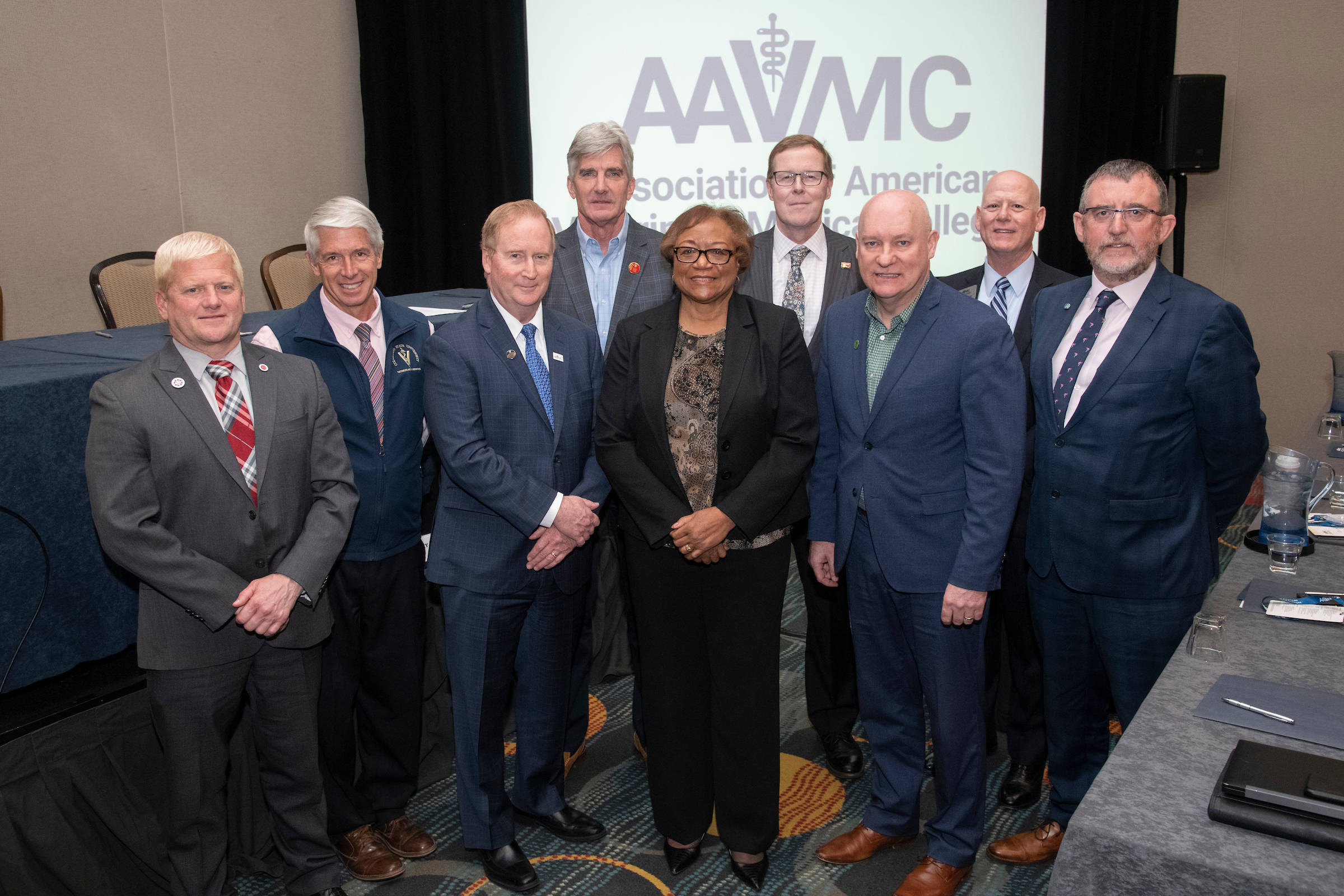
Photo caption: (From left) Dr. Rustin Moore, dean of the Ohio State University College of Veterinary Medicine; Dr. Mark D. Stetter (Treasurer), dean of the Colorado State University College of Veterinary Medicine and Biomedical Sciences; Dr. Michael Lairmore (Past-President), dean of the UC Davis College of Veterinary Medicine; Dr. Mark Markel (President), dean of the University of Wisconsin School of Veterinary Medicine; Dr. Ruby Perry (Secretary), dean of the Tuskegee University College of Veterinary Medicine; Dr. Paul Lunn (President-Elect), dean of the North Carolina State University College of Veterinary Medicine; Dr. Greg Keefe, dean of Atlantic Veterinary College; AAVMC CEO Dr. Andrew T. Maccabe; and Dr. Sean Callanan, dean of the Ross University College of Veterinary Medicine. Not shown: Dr. Nigel Perkins, head of the School of Veterinary Science, University of Queensland; Dr. David W. Horohov, Department of Veterinary Science, University of Kentucky; Dr. Roger Fingland, executive associate dean at The Ohio State University College of Veterinary Medicine; Dr. Carolyn Henry, dean, University of Missouri College of Veterinary Medicine; and Dr. Tiffany Whitcomb, Penn State University College of Medicine, Department of Comparative Medicine.
New officers and board members were formally elected and several presentations were made during the annual Assembly Meeting on March 6.
Dr. Mark Markel, dean of the University of Wisconsin School of Veterinary Medicine, became AAVMC President and Dr. Paul Lunn, dean of the North Carolina State University College of Veterinary Medicine, was elected President-Elect. Dr. Michael Lairmore transitioned into the role of Past-President.
Dr. Rustin Moore, dean of the Ohio State University College of Veterinary Medicine, became At-Large Director Representing Region I (U.S.); Dr. Sean Callanan, dean of the Ross University School of Veterinary Medicine became At-Large Director Representing Region IV (Europe, Mexico and the Caribbean); and Dr. David W. Horohov, the Jes E. and Clementine M. Schlaikjer Endowed Chair in the Department of Veterinary Science at the University of Kentucky, began a second term as At-Large Director Representing Departments of Veterinary Science.
The AAVMC officially introduced a new strategic framework and unveiled a new, rebranded visual presence that includes an emboldened logo and a new tagline: “Trusted Leader, Valued Partner, Advancing Health.”
AAVMC Chief Executive Officer Dr. Andrew T. Maccabe also announced the launch of “AAVMC Connect,” a password-protected, enterprise-wide system for organizational communication and networking. He said the organization will also expand offerings in leadership development and continue work on the Competency Based Veterinary Education initiative (CBVE).
During a special presentation, Dr. Erin Sorrell from the Georgetown University Center for Global Health Science and Security spoke about the COVID-19 outbreak and response. She also provided the perspective of an historical overview of related coronaviruses, such as SARS in 2002 and MERS in 2012.
In the previous week, Congress had designated $8 billion in supplemental funds to fight the virus. “I encourage members with disease-fighting efforts related to that effort to apply for those funds,” encouraged outgoing AAVMC President Dr. Michael Lairmore, dean of the College of Veterinary Medicine at UC Davis.
AAVMC Hires New Director for Wellbeing
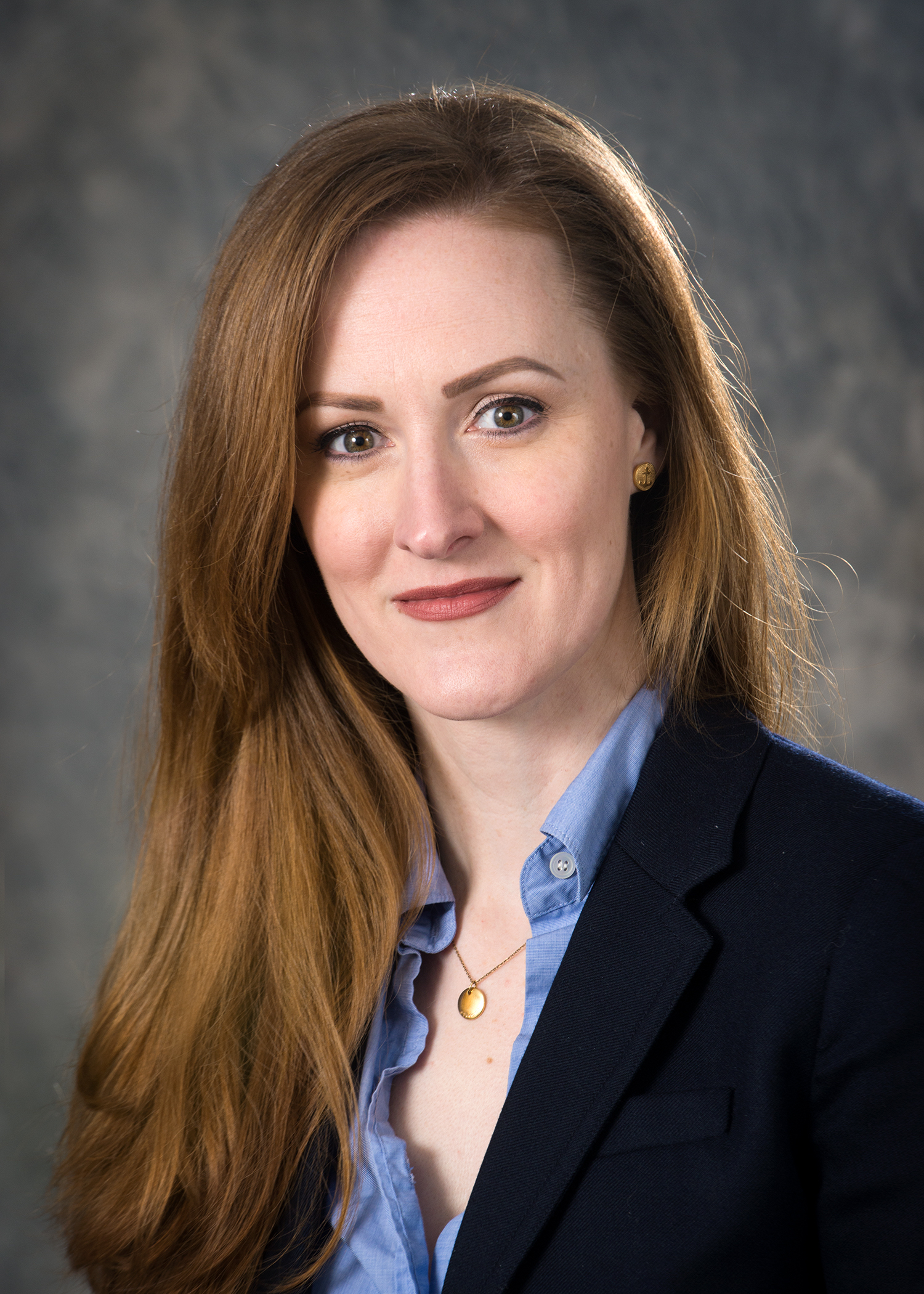 Over the past several years, the veterinary medical community has increasingly focused on wellbeing. That move followed growing recognition that the veterinary medical profession carries a risk of suicide that is higher than the general population and experiences other job-related stresses and hazards, such as compassion fatigue.
Over the past several years, the veterinary medical community has increasingly focused on wellbeing. That move followed growing recognition that the veterinary medical profession carries a risk of suicide that is higher than the general population and experiences other job-related stresses and hazards, such as compassion fatigue.
Many member institutions have hired mental health professionals and counselors, and the AAVMC recently established a Veterinary Mental Health Professionals (VMHP) group within the Academic Affairs Committee to help coordinate their efforts and share practices.
Now, the AAVMC has created a new Director for Wellbeing position and hired Makenzie Peterson to develop and implement programs that promote wellbeing at AAVMC member institutions. Peterson will bring a systems-oriented, community wellbeing perspective to this important new position.
Peterson has been serving as Wellbeing Program Director at the Cornell University College of Veterinary Medicine and as Vice Chair of the VMHP.
“Makenzie is a widely respected professional in a rapidly emerging field and we’re delighted to welcome her to the AAVMC,” said CEO Dr. Andrew T. Maccabe. “This is a critical moment in the development of a very important program for us. Makenzie’s expertise, network and systems perspective will be instrumental in helping us elevate the quality of wellbeing programs throughout our academic community.”
As a public health professional, Peterson’s expertise is in the development of community-wide programming that complements individual clinical counseling efforts to improve overall wellbeing. Her duties will include catalyzing the development of a wellbeing initiatives for academic veterinary medicine and working with mental health professionals at all member institutions to develop outreach and other programs that enhance the wellbeing of faculty, staff and students.
“In times like this, wellbeing is more important than ever,” said Peterson. “I’m excited to be part of the AAVMC team and collaborate with all the member institutions to help us collectively work towards a culture of wellbeing in academic veterinary medicine.”
At Cornell, Peterson developed and led a comprehensive wellbeing program to enhance community wellbeing, productivity, satisfaction, and academic and professional success for faculty, staff, and students.
She formerly served as a health specialist for an MIT/Harvard-sponsored start-up that was based in Harvard Business School’s Innovation Lab that focused on educating college students on health topics. Peterson is also a health and wellness coach, certified rape crisis counselor, and opioid overdose prevention educator.
Peterson regularly speaks on topics related to mental and physical health, stress reduction, suicide prevention, compassion fatigue and burnout, mindfulness and meditation, interpersonal communication, grief and loss, imposter syndrome, growth mindset and resiliency, ethics and core values, and other wellbeing-related topics.
Peterson earned a Bachelor of Science in International Studies and a Master of Science (MSc) in health promotion and health education from the University of Utah. She will also be completing her Doctorate of Social Work (DSW) from the University of Southern California in 2022. Peterson begins her new position on April 20.
New Strategic Plan Introduced
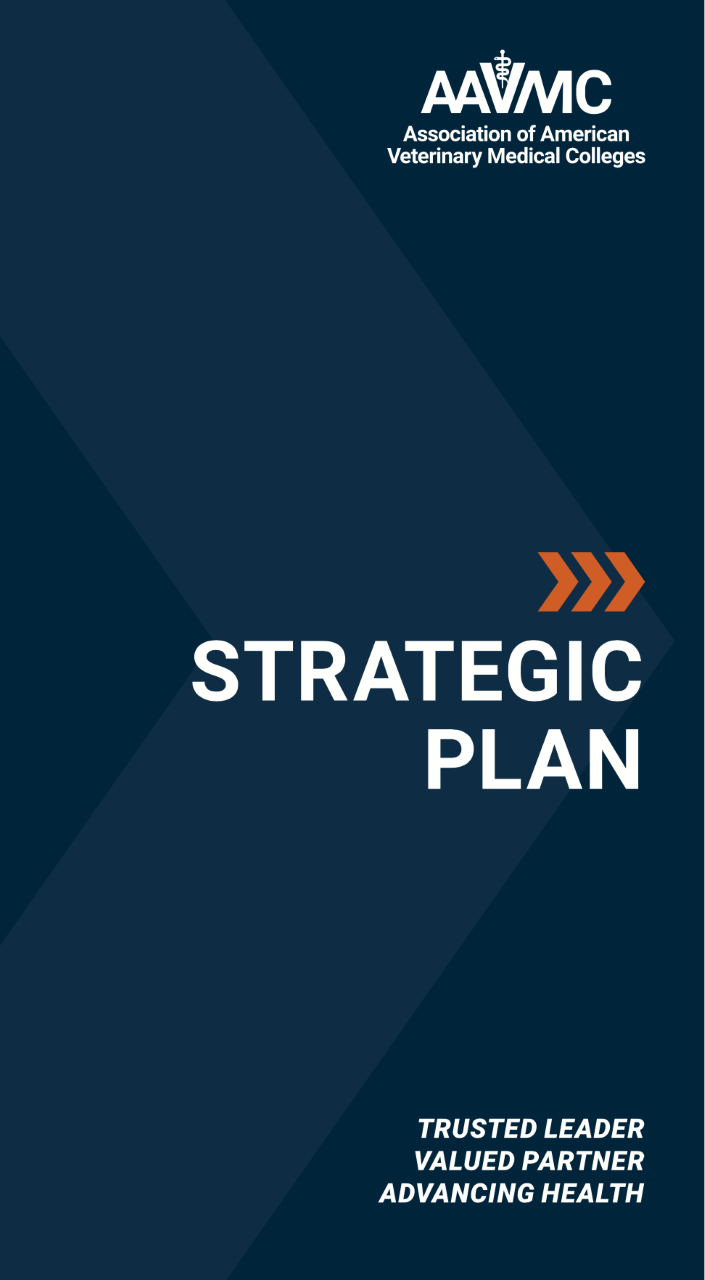 Following a year-long, highly consultative process that sought input from hundreds of stakeholders, the AAVMC has produced a new Strategic Plan.
Following a year-long, highly consultative process that sought input from hundreds of stakeholders, the AAVMC has produced a new Strategic Plan.
Facilitated by Washington, D.C. based CHP Mintz, the process produced a product that preserves the AAVMC’s established Analyze, Catalyze and Advocate operating paradigm, but is entirely reconceived.
“We are grateful to the many wise thinkers and strategists who helped create this plan,” said AAVMC CEO Dr. Andrew T. Maccabe. “The plan aligns us more precisely than ever before with the needs and expectations of our stakeholders, and we believe it provides us with a roadmap to excellence during the years ahead.”
The plan recasts vision, mission, values and goals in a manner that positions the AAVMC for success and impact in the rapidly changing world of veterinary medicine. It sets direction, organizes workflows and informs resource allocation to ensure organizational performance and accountability.
The new vision statement is “Academic veterinary medicine is a trusted leader and valued partner in advancing health.” The development of that vision statement led the AAVMC to retire its former tagline of “The Future of Veterinary Medicine” and adopt a new tagline: “Trusted Leader. Valued Partner. Advancing Health.”
A new mission statement was also developed during the process: “AAVMC inspires innovation and promotes excellence in academic veterinary medicine worldwide.”
The organization’s core values were defined to include Integrity, Service, Diversity, Inclusion and Excellence.
The plan also includes a series of goals and objectives with highly articulated language to guide program direction, organizational performance and accountability.
New Director Named for the AAVMC’s 2020-21 Leadership Academy
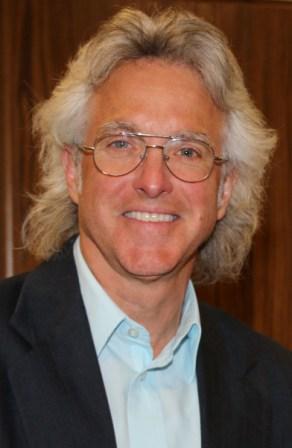 Dr. Rod Bagley from Iowa State University is the new director of the AAVMC’s 2020-21 Leadership Academy.
Dr. Rod Bagley from Iowa State University is the new director of the AAVMC’s 2020-21 Leadership Academy.
The Leadership Academy, sponsored by Elanco, offers a unique growth opportunity for emerging leaders in academic veterinary medicine. Founded in 2012, the AAVMC launched the academy in 2012 to cultivate good leadership in academic veterinary medicine and provide a forum for building lasting ties between faculty members at veterinary schools and departments around the world.
The academy addresses how to develop effective leadership skills around the themes of communication, emotional intelligence and applied leadership skills.
Dr. Bagley is a professor and chair of the Department of Veterinary Clinical Sciences at Iowa State’s College of Veterinary Medicine, where he also directs the university’s Emerging Leaders Academy.
A graduate of the Virginia-Maryland College of Veterinary Medicine, Dr. Bagley completed a small animal internship and internal medicine residency at Cornell University and a residency in neurology and neurosurgery at North Carolina State University. He is a diplomate of the American College of Veterinary Internal Medicine in both neurology and internal medicine and the author of over 200 scientific articles, abstracts and book chapters related to neurology, neurosurgery, and internal medicine. He has presented over 300 scientific presentations, including national meetings and internationally and authored two books: “Fundamentals of Veterinary Clinical Neurology” and “Practical Small Animal MRI.”
“The leadership academy provides a platform to keep our profession strong and thriving for the future,” said Dr. Bagley. “Being able to support our profession in this way is both humbling and rewarding.”
Bagley believes that the importance of leadership is especially evident during times of crisis, such as what the nation and the world are experiencing now during the COVID-19 pandemic. He encourages everyone to demonstrate leadership within their own sphere of influence. “You are not a leader by position—you are a leader when others want to follow,” he said. “Do the right thing with the right intent and people will want to follow you.”
Leadership Academy participation is limited to faculty and staff at AAVMC member institutions, with each member institution typically enrolling one participant who is chosen by the dean based upon demonstrated leadership or potential.
The 2020-21 Leadership Academy will meet September 9-11, 2020, December 2-4, 2020 and March 1-3, 2021. The nomination period will open in mid-May and close in July. For additional details on the 2020-21 Leadership Academy, please visit the Leadership Academy page. https://www.aavmc.org/leadership/leadership-academy.
2020 Cost Comparison Tool Introduced
The AAVMC’s Cost Comparison Tool has been recently updated for 2020. Created in 2017 to help applicants make more informed decisions about pursuing their professional education, the online, interactive tool contains comprehensive datasets concerning tuition, cost of living, scholarship resources and other valuable information.
The 2020 version includes information about 30 U.S. and 11 international colleges and schools of veterinary medicine. Site visitors can access:
- Total cost of attendance for the Class of 2020
- The amount of college based scholarship aid available to DVM students
- Whether institutions allow students to establish residency
- Median debt for the most recent graduating class (2019)
- First year tuition for current 1st years
The 2020 version also includes the total percentage that tuition increased for the Class of 2020 for each institution. This will help viewers get a sense of what kinds of increases to potentially anticipate when they enroll, according to AAVMC Senior Director for Institutional Research and Diversity Dr. Lisa Greenhill.
CIVME Funds 2020 Series of Educational Grants

The AAVMC’s Council on International Veterinary Medical Education (CIVME) has funded four program grants designed to foster the enrichment and advancement of international academic veterinary medicine.
This year’s program included funding the first MSD Animal Health CIVME Antimicrobial Stewardship Grant. This newly established program is the result of a recent collaboration with MSD Animal Health that seeks to improve instructional programs related to antimicrobial resistance in educational institutions around the world.
Nine applications for the inaugural grant of $10,000 were reviewed by CIVME officials. The funded project was “Antimicrobial Stewardship Cooperative,” which was submitted by Laura Hardefeldt of the University of Melbourne in collaboration with Kirsten Bailey and Glenn Browning of the University of Melbourne, and Scott Weese of the University of Guelph.
This year, 22 proposals representing collaborative efforts from around the world were reviewed during the traditional educational microgrant funding process that began when CIVME was established in 2016.
Funded programs and principle investigators include:
- “Appalachia to East Africa: Improving Veterinary Student Outcomes Through Teacher Training,” submitted by Jamie Stewart of Virginia Tech in collaboration with Cassidy Rist and Jennifer Hodgson, Virginia-Maryland College of Veterinary Medicine; Misty Bailey, India Lane and Marcy Souza, University of Tennessee; Julie Hunt and Katherine Fogelberg, Lincoln Memorial University; Samuel Majalija, Makerere, Uganda; Jane Mburu, Egerton, Kenya; and A. Muhairwa, Sokoine, Tanzania.
- “What Makes a Curriculum Leader in Veterinary Education?” submitted by Sheena Warman of the University of Bristol and Elizabeth Armitage-Chan of the Royal Veterinary College in London in collaboration with Katy Cobb, University of Nottingham; Heidi Janicke, St. George’s University; Emma Read, The Ohio State University; Mario Baratta, University of Turin; and Sarah Kelly; University of Bristol.
- “Capacity Building in Veterinary Educational Research by Developing an Open Access Resource to Support Community Members,” submitted by Julie Hunt of Lincoln Memorial University in collaboration with Sarah Baillie of the University of Bristol; Mirja Ruohoniemi, University of Helsinki; Waraporn Aumarm, Bangkok University; Manuel Boller, University of Melbourne; and Victoria Philips, Society for the Protection of Animals Abroad.
CIVME was founded in 2016 to help advance AAVMC interests in elevating the quality of international academic veterinary medicine. Specifically, the charge from the AAVMC Board of Directors was to “advance high-quality veterinary education internationally through enabling and empowering best practice.” CIVME seeks to advance their initiatives by promoting inter-regional collaboration.
CIVME addresses that through:
- Communication and collaboration that advances veterinary medical education around the world
- Facilitating collaboration among educational researchers
- Disseminating innovations and other educational advances to educators and institutions to magnify the impact of projects
CIVME comprises representatives from eight major global regions (Australasia, North America, Central/South America, Continental Europe, UK/Ireland, Middle East, Africa and Asia).
AAVMC Cancels 2020 Veterinary Educator Collaborative Scheduled for June at Kansas State
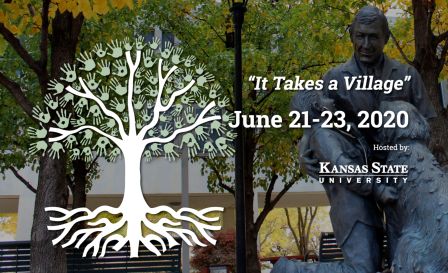 The AAVMC has cancelled the 2020 AAVMC Veterinary Educator Collaborative Symposium originally scheduled for June 21-23 at Kansas State University as a result of the COVID-19 pandemic emergency.
The AAVMC has cancelled the 2020 AAVMC Veterinary Educator Collaborative Symposium originally scheduled for June 21-23 at Kansas State University as a result of the COVID-19 pandemic emergency.
“We recognize the tremendous amount of work that our colleagues at Kansas State University have already put into the planning and hosting of the symposium and we are very grateful for everything they have done,” said AAVMC CEO Dr. Andrew T. Maccabe. “But we have made this decision to protect the health and safety of our members. In the event KSU desires to host the event in a future summer, we would welcome that opportunity.”
The AAVMC is in the process of communicating with registrants and processing refunds.
Brand Refresh Complements New Strategic Plan
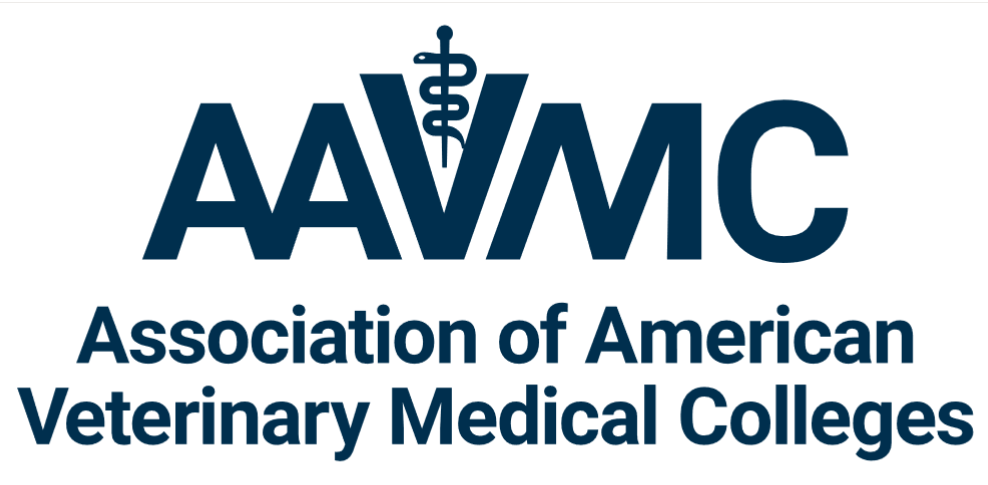
The AAVMC has “refreshed” it’s brand to complement the development and introduction of a new strategic plan.
The changes are iterative and structured upon existing graphic design conventions, but embrace the new “Trusted Leader, Valued Partner, Advancing Health” tagline and project a crisp, more dynamic identity, according to Chief Communications Officer Jeff Douglas.
Most visible among the series of changes is a new organizational logo which is clearly reminiscent of the former AAVMC logo but casts a bolder, stronger identity.
“We believe the new logo better projects the sense of leadership, strength and achievement our stakeholders have come to expect from the AAVMC,” said Douglas. “From a more practical perspective, this is a more functional and more scalable logo across different print and digital platforms.”
The AAVMC’s analogous orange and blue color pallete will be continued, but the blue has shifted from a slate blue to a navy blue. A chevron-shaped graphic element, suggesting steady forward motion, will also be utilized.
Washington, D.C. based graphic design agency Abstract Orange created and produced the brand refresh.
Publications like the AAVMC’s new strategic plan reflect the new look, and it will be gradually introduced across the portfolio of communication products during the weeks and months ahead.
AAVMC Virtual Admissions Fair Draws More Than 1,100 Attendees

A Virtual Veterinary Medical Admissions Fair on March 31 featured more than 1,100 attendees and representatives from 28 national and international AAVMC member institutions.
“These virtual events are an important way for member schools to reach out to students, answer their questions, and guide them through the application process during an otherwise confusing and unsettling time,” she said.
The fair gave prospective students the opportunity to chat online via video and text with admissions and VMCAS representatives, learn more about the application process and compare opportunities among schools and colleges.
Of the 1,122 attendees, about 66 percent were current college students, seven percent were graduate students and 64.4 percent have started their VMCAS 2021 application.
“We will be looking to launch another virtual fair later this summer 2020 and will seek input from our schools about having more virtual fairs given the impact of COVID-19 on face-to-face recruitment efforts,” said the AAVMC’s Director for Admissions & Recruitment Affairs Diana Dabdub.
The fair, which was free for all prospective students and advisors, is one of several virtual events that the AAVMC hosts throughout the year that are geared toward helping students learn more about how to prepare for veterinary medical school.
IPEC Creates COVID-19 Resource Page for Members
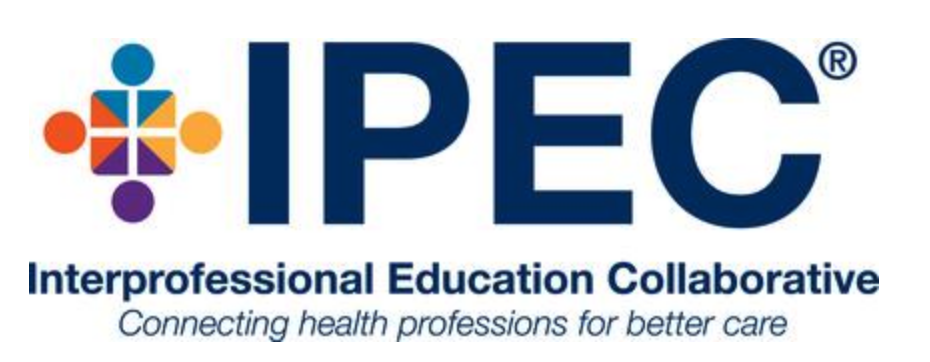 The Interprofessional Educational Collaborative has created a COVID-19 resource page to assist members in accessing up-to-date information about the historic pandemic.
The Interprofessional Educational Collaborative has created a COVID-19 resource page to assist members in accessing up-to-date information about the historic pandemic.
The site contains links to a number of archived webinars, links to information resources provided by the CDC, the WHO and the NIH, and other useful information.
IPEC created the site to support the information needs of health professions educators, students, and other stakeholders. Interested readers are invited to check the page regularly, as it is being updated as new information becomes available.
Established in 2009 to advance interprofessional learning experiences and promote team-based care, IPEC now includes 21 different associations of schools in the health professions, including the AAVMC.
In the News
Ventilators Shipped from Veterinarians to Hospitals to Combat COVID-19 ShortageABC News
Veterinarians Donate Vital Supplies to Coronavirus Fight
New York Times
Can Pets Get the Coronavirus?
Los Angeles Times
CSU Researchers Pursue a Vaccine to Target an Achilles Heel of the Coronavirus
Medical Xpress
How the Novel Coronavirus Binds to Human Cells
Neuroscience News
AAVMC Conference Wraps up Just in Time
Today’s Veterinary Business
How to Keep Pets Happy While Social Distancing
Government Executive
Sit, Stay Forever: Americans Willing to Pay Top Dollar to Keep Old Dogs Alive
Reuters
NC State Veterinarian: Coronavirus Can’t Spread from Dogs to People
WRAL
VET MED Act Introduced to Alleviate Veterinary Student Debt
Ag News
Report Looks to Future of Veterinary Profession
JAVMA News
Head of Pennsylvania Agency Says his Team is Working to Combat Chronic Wasting Disease
The Daily Review
UGA Researchers Report Possible Breakthrough in Parkinson’s Treatment
WGAU AM
UC Davis Veterinarians Create Life-saving Addison’s Disease Diagnostic Tool
dvm360
Partnering through a Pandemic: PennVet’s New Bolton Center Launches Innovative Telehealth Service Amid COVID-19
The Plaid Horse Magazine
Honour for RVC Senior Vice-Principal
Vet Times
From Our Members
UW–Madison, FluGen, Bharat Biotech to Develop CoroFlu, a Coronavirus VaccineUniversity of Wisconsin
Texas A&M, NC State Researchers Develop Online Tool For COVID-19 Risk Assessment
Texas A&M
PREDICT Receives Extension for COVID-19 Pandemic Emergency Response
UC Davis
COVID-19 Working Group Gears Up
Cornell University
WSU Laboratory Begins Limited Testing for COVID‑19 Virus
Washington State
How a Blood-Clotting Protein Signals Liver Regeneration After Resection Surgery
Michigan State
$2 Million Gift from Leading Ag Organizations Supports VDL
Iowa State
“Like” us on Facebook or follow us on Twitter:




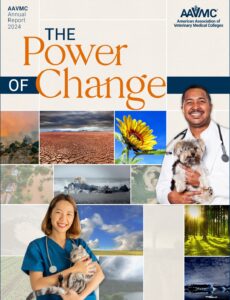
SHARE